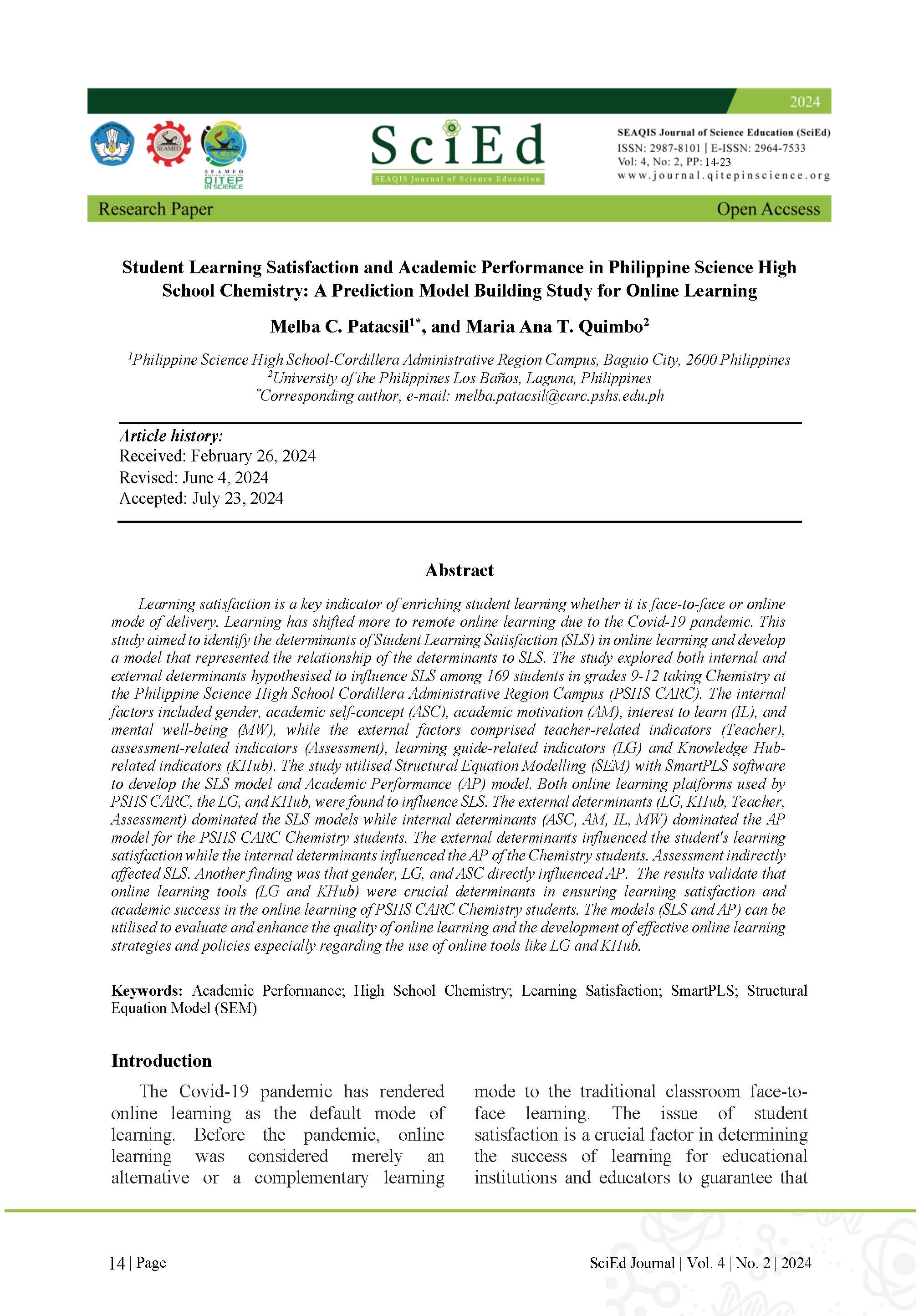Student Learning Satisfaction and Academic Performance in Philippine Science High School Chemistry: A Prediction Model Building Study for Online Learning
DOI:
https://doi.org/10.58249/sjse.v4i02.137Keywords:
Academic Performance, High School Chemistry, Learning satisfaction, SmartPLS, structural equation model (SEM)Abstract
Learning satisfaction is a key indicator of enriching student learning whether it is face-to-face or online mode of delivery. Learning has shifted more to remote online learning due to the Covid-19 pandemic. This study aimed to identify the determinants of Student Learning Satisfaction (SLS) in online learning and develop a model that represented the relationship of the determinants to SLS. The study explored both internal and external determinants hypothesised to influence SLS among 169 students in grades 9-12 taking Chemistry at the Philippine Science High School Cordillera Administrative Region Campus (PSHS CARC). The internal factors included gender, academic self-concept (ASC), academic motivation (AM), interest to learn (IL), and mental well-being (MW), while the external factors comprised teacher-related indicators (Teacher), assessment-related indicators (Assessment), learning guide-related indicators (LG) and Knowledge Hub-related indicators (KHub). The study utilised Structural Equation Modelling (SEM) with SmartPLS software to develop the SLS model and Academic Performance (AP) model. Both online learning platforms used by PSHS CARC, the LG, and KHub, were found to influence SLS. The external determinants (LG, KHub, Teacher, Assessment) dominated the SLS models while internal determinants (ASC, AM, IL, MW) dominated the AP model for the PSHS CARC Chemistry students. The external determinants influenced the student's learning satisfaction while the internal determinants influenced the AP of the Chemistry students. Assessment indirectly affected SLS. Another finding was that gender, LG, and ASC directly influenced AP. The results validate that online learning tools (LG and KHub) were crucial determinants in ensuring learning satisfaction and academic success in the online learning of PSHS CARC Chemistry students. The models (SLS and AP) can be utilised to evaluate and enhance the quality of online learning and the development of effective online learning strategies and policies especially regarding the use of online tools like LG and KHub.
References
Ansari, A. A., Kumar, A., Alsaleh, A., Arekat, M. R., & Salem, A. H. (2021). Validation of academic motivation scale among medical students using factor analysis and structural equation modelling: Middle Eastern perspective. Journal of Education and Health Promotion, 10(1), 364. https://doi.org/10.4103/jehp.jehp_1553_20.
Bahati, B., Fors, U., Hansen, P., Nouri, H. & Mukama, E, (2019). Measuring Learner Satisfaction with Formative e-Assessment Strategies. International Journal of Emerging Technologies in Learning (iJET), 14(07), 61. https://doi.org/10.3991/ijet.v14i07.9120.
Dziuban, C., Moskal, P., Thompson, J., Kramer, L., DeCantis, G., Hermsdorfer, A. (2015). Student Satisfaction with Online Learning: Is it a Psychological Contract? Journal of Asynchronous Learning Network. 19. 10.24059/olj.v19i2.496.
Fieger, P. F. (2012). Measuring student satisfaction from the Student Outcomes Survey. National Centre for Vocational Education Research. ISBN-978-1-9220-5606-1
Hassan, S. U. N., Algahtani, F. D., Zrieq, R., Aldhmadi, B. K., Atta, A., Obeidat, R. A., & Kadri, A. (2021). Academic Self-Perception and Course Satisfaction among University Students Taking Virtual Classes during the COVID-19 Pandemic in the Kingdom of Saudi-Arabia (KSA). Education Sciences, 11(3), 134. https://doi.org/10.3390/educsci11030134.
Raynor, J. R., & White, E. W. (2013). Investigation of Academic Self-Concept of Undergraduates in STEM Courses. Journal of Studies in Social Sciences, 5(1). ISSN 2201-4624
Ranadewa, D.U.N, Gregory, T.Y., &Buralugoda, D. N. (2021). Learners’ Satisfaction and Commitment Towards Online Learning During COVID-19: A Concept Paper. The Journal of Business Perspective. https://doi.org/10.1177/09722629211056705.
She, L., Ma, L., Jan, A, Nia, H.S. & Rahmatpour, P. (2021). Online Learning Satisfaction During COVID-19 Pandemic Among Chinese University Students: The Serial Mediation Model. Front. Psychol., Sec. Educational Psychology,12.
https://doi.org/10.3389/fpsyg.2021.743936.
Tennant, R., Hiller, L., Fishwick, R., Platt, S., Joseph, S., Weich, S., Parkinson, J., Secker, J., & Stewart-Brown, S. (2007). The Warwick-Edinburgh Mental Well-being Scale (WEMWBS): development and UK validation. Health and Quality of Life Outcomes, 5(1). https://doi.org/10.1186/1477-7525-5-63.
Usher, E. L., & Morris, D. L. (2012). Academic Motivation. Springer eBooks, 36–39. https://doi.org/10.1007/978-1-4419-1428-6_834.
Yu, Z., & Deng, X. (2022). A Meta-Analysis of Gender Differences in e-Learners’ Self-Efficacy, Satisfaction, Motivation, Attitude, and Performance Across the World. Frontiers in Psychology, 13. https://doi.org/10.3389/fpsyg.2022.897327.
Zhan, Z., & Mei, H. (2013). Academic self-concept and social presence in face-to-face and online learning: Perceptions and effects on students’ learning achievement and satisfaction across environments. Computers & Education, 69, 131-138. https://doi.org/10.1016/j.compedu.2013.07.002.

Downloads
Published
Issue
Section
Citation Check
License
Copyright (c) 2024 SEAQIS Journal of Science Education

This work is licensed under a Creative Commons Attribution 4.0 International License.

This work is licensed under a Creative Commons Attribution 4.0 International License.














